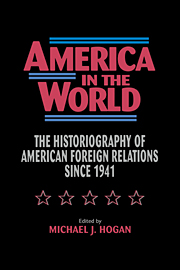Book contents
- Frontmatter
- Contents
- Preface
- The Authors
- Part One The State of the Art
- Part Two The Historiography of American Foreign Relations since 1941
- 6 The Historiography of American Foreign Relations: An Introduction
- 7 A Half-Century of Conflict: Interpretations of U.S. World War II Diplomacy
- 8 The Decision to Use the Bomb: A Historiographical Update
- 9 Origins of the Cold War in Europe and the Near East: Recent Historiography and the National Security Imperative
- 10 Making Known the Unknown War: Policy Analysis of the Korean Conflict since the Early 1980s
- 11 Eisenhower Revisionism: The Scholarly Debate
- 12 John F. Kennedy as World Leader: A Perspective on the Literature
- 13 The Unending Debate: Historians and the Vietnam War
- 14 Complaints, Self-Justifications, and Analysis: The Historiography of American Foreign Relations since 1969
- 15 An Emerging Synthesis? U.S.–Latin American Relations since the Second World War
- 16 Gideon's Band: America and the Middle East since 1945
- 17 The Cold War in Asia: The Elusive Synthesis
- 18 The Power of Money: The Historiography of American Economic Diplomacy
- 19 Coming in from the Cold War: The Historiography of American Intelligence, 1945–1990
- Index
14 - Complaints, Self-Justifications, and Analysis: The Historiography of American Foreign Relations since 1969
Published online by Cambridge University Press: 05 June 2012
- Frontmatter
- Contents
- Preface
- The Authors
- Part One The State of the Art
- Part Two The Historiography of American Foreign Relations since 1941
- 6 The Historiography of American Foreign Relations: An Introduction
- 7 A Half-Century of Conflict: Interpretations of U.S. World War II Diplomacy
- 8 The Decision to Use the Bomb: A Historiographical Update
- 9 Origins of the Cold War in Europe and the Near East: Recent Historiography and the National Security Imperative
- 10 Making Known the Unknown War: Policy Analysis of the Korean Conflict since the Early 1980s
- 11 Eisenhower Revisionism: The Scholarly Debate
- 12 John F. Kennedy as World Leader: A Perspective on the Literature
- 13 The Unending Debate: Historians and the Vietnam War
- 14 Complaints, Self-Justifications, and Analysis: The Historiography of American Foreign Relations since 1969
- 15 An Emerging Synthesis? U.S.–Latin American Relations since the Second World War
- 16 Gideon's Band: America and the Middle East since 1945
- 17 The Cold War in Asia: The Elusive Synthesis
- 18 The Power of Money: The Historiography of American Economic Diplomacy
- 19 Coming in from the Cold War: The Historiography of American Intelligence, 1945–1990
- Index
Summary
In 1990, at the end of a long doctoral oral exam, I tried to lighten the load of the Ph.D. candidate. “Of the hundreds of books you read in preparation what are the worst and the best,” I asked. He groped about for the worst: he could think of many contenders, but his award for the best came swiftly: Raymond Garthoff's Détente and Confrontation. I gulped, thinking the student was trying some transparent flattery. I customarily spend a couple of weeks in a graduate reading seminar analyzing Détente and Confrontation. “Not the heaviest, but the best,” I said.
The student then explained what makes Garthoff's book so good: Its reflections by a participant who is refreshingly modest, not a know-it-all; its vast command of available U.S. and Soviet sources; its masterful grasp of the interplay between domestic and foreign policy considerations; its demonstration that Soviet policy, like American, resulted from a complicated mixture of internal and external forces. I probed deeper. “Don't you believe it is really three books, one on the Nixon-Ford period, one on the Carter administration, and one on Reagan? The first section, down to 1976, is splendid, but the analysis in the last six hundred pages may not stand the test of time. Wouldn't many historians resist the predictions in the last section decrying the Reagan administration's anti-Soviet bluster?” Alright, he agreed, maybe the sections on the Nixon-Ford period were so richly detailed that the discussion of the Carter years suffered by comparison, and the account of the Reagan administration's early belligerence toward Moscow did not completely predict the future.
- Type
- Chapter
- Information
- America in the WorldThe Historiography of US Foreign Relations since 1941, pp. 395 - 423Publisher: Cambridge University PressPrint publication year: 1996



